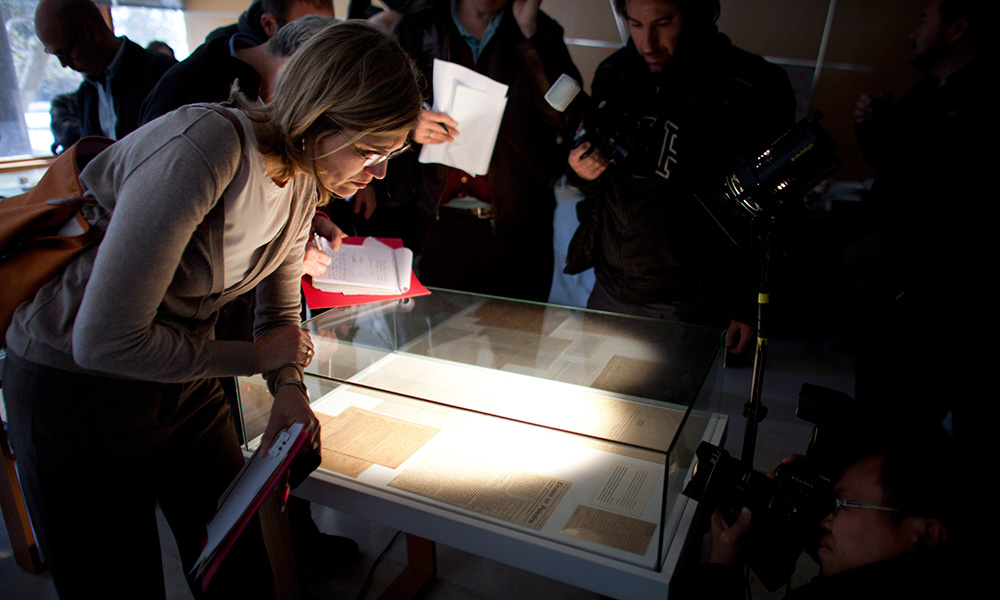
Backlash Heats Up Over Association’s Academic Boycott of Israel
Citing academic freedom as a primary concern, a number of large universities have distanced themselves from the American Studies Association, which sparked controversy after approving an academic boycott of Israel last month.
Citing academic freedom as a primary concern, a number of large universities have distanced themselves from the American Studies Association, which sparked controversy after approving an academic boycott of Israel last month.
A recent resolution by the American Studies Association (ASA) to support an academic boycott of Israel is leading to a boycott of its own—against the idea of academic boycotts.
The resolution, which passed a member vote last month by a margin of 2 to 1, cites a lack of academic freedom for Palestinians and claims that higher education institutions in Israel “are a party to Israeli state policies that violate human rights and negatively impact the working conditions of Palestinian scholars and students.”
Several major U.S. colleges and universities, as well as the Association of American Universities (AAU), oppose the ASA resolution, citing concerns over academic freedom and political motivations. More details below:
Any such boycott of academic institutions directly violates academic freedom, which is a fundamental principle of AAU universities and of American higher education in general.
Voice of opposition: Late last month, AAU made a statement officially opposing academic boycotts on principle, a stance consistent with its previously stated views. “Any such boycott of academic institutions directly violates academic freedom, which is a fundamental principle of AAU universities and of American higher education in general,” the group said in the statement (PDF). The association’s letter coincided with similar statements from at least 92 universities opposing such boycotts on principle, according to The Jerusalem Post.
Harvard, Yale among opposed: While not actively removing themselves from the association, both Harvard and Yale are among the schools that are publicly opposing the boycott. “Academic boycotts subvert the academic freedoms and values necessary to the free flow of ideas, which is the lifeblood of the worldwide community of scholars,” Harvard said in a statement. “The recent resolution of the ASA proposing to boycott Israeli universities represents a direct threat to these ideals, ideals which universities and scholarly associations should be dedicated to defend.” Yale President Peter Salovey, meanwhile, called the ASA resolution “antithetical to the fundamental values of scholarship and academic freedom” but noted that the school’s faculty members were free to disagree on this point. Many schools that have released statements about the boycott have emphasized that the decision whether to leave the association is up to their respective American Studies departments.
Dropped memberships: At least four schools—Brandeis, Indiana University, Kenyon College, and Penn State Harrisburg—have dropped their institutional memberships in ASA, according to Tablet Magazine. A number of other schools listed in ASA’s member directory, including Brown and Northwestern, have said they are not members of the association, according to the magazine.
Defending the resolution: Several individual professors who are ASA members have defended the resolution, as well as the BDS (boycott, divestment, and sanctions) movement that inspired the boycott, in editorial pieces. “The BDS movement demands what Israel actually pretends to be: a normal democracy in a state of all its people,” wrote University of California, Riverside, professor David Lloyd. “It does not ask anyone to leave or to accept less than equal rights. It asks only that Jews be willing to live on equal terms with non-Jews, with Palestinians or Bedouins, Christian, Muslim, or secular, and to live in a land of all its people. That would be real belonging, not colonial settlement.” Vanderbilt University humanities professor Colin Dayan called the backlash “predictable” in an article for Al Jazeera America.
But even among members, the move is controversial. Wesleyan University professor Richard Slotkin, a member of the association since 1966 and a well-known historian, is among the members asking the association to reverse the vote in a comments page on the association’s website.
ASA isn’t the only U.S. group supporting a boycott. The Association for Asian American Studies had previously approved a similar resolution (PDF), and since the ASA vote, the Native American and Indigenous Studies Association has followed suit.
The Hebrew University of Jerusalem displays documents from its Albert Einstein Archives in Jerusalem. The archive, built in collaboration with a U.S.-based organization, was expanded in 2012. (Photo by Uriel Sinai/Getty Images)






Comments